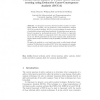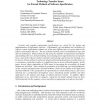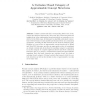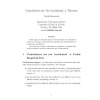549 search results - page 16 / 110 » Using Formal Concept Analysis in Mathematical Discovery |
EDCC
2005
Springer
14 years 19 days ago
2005
Springer
Abstract. In this paper we present the formal safety analysis of a radiobased railroad crossing. We use deductive cause-consequence analysis (DCCA) as analysis method. DCCA is a no...
CSEE
2000
Springer
13 years 11 months ago
2000
Springer
Accurate and complete requirements specifications are crucial for the design and implementation of high-quality software. Unfortunately, the articulation and verification of softw...
ICCS
2004
Springer
14 years 15 days ago
2004
Springer
Abstract. Infinite contexts and their corresponding lattices are of theoretical and practical interest since they may offer connections with and insights from other mathematical ...
FMSD
2007
13 years 7 months ago
2007
This paper addresses the graphical representation of static aspects of B specifications, using UML class diagrams. These diagrams can help understand the specification for stakeho...
CAS
1999
13 years 6 months ago
1999
In this paper, we formalize and prove the statement that coincidences cannot be accidental, a statement that underlies many useful heuristics in mathematics and physics. Our proof...




